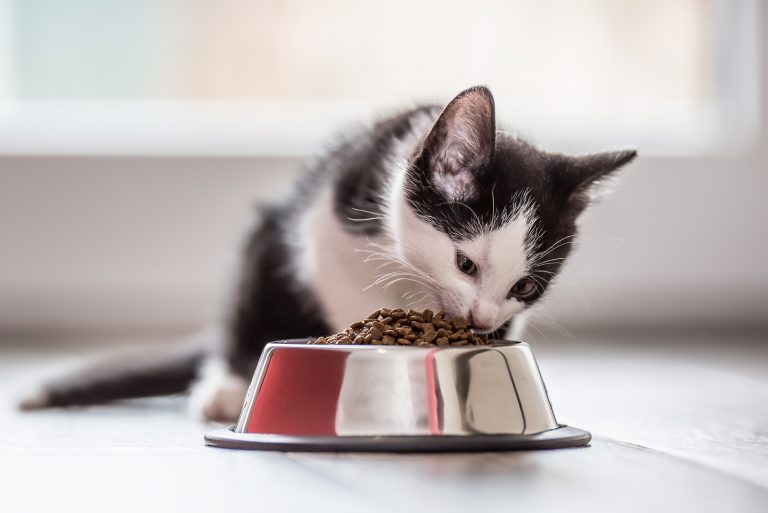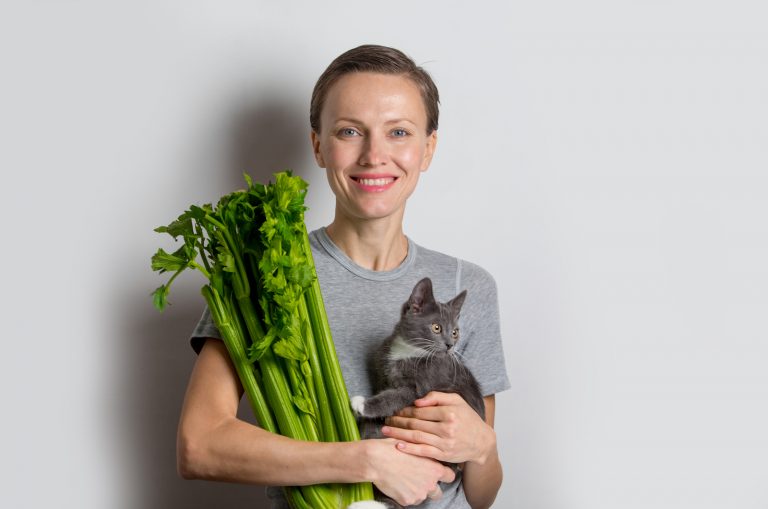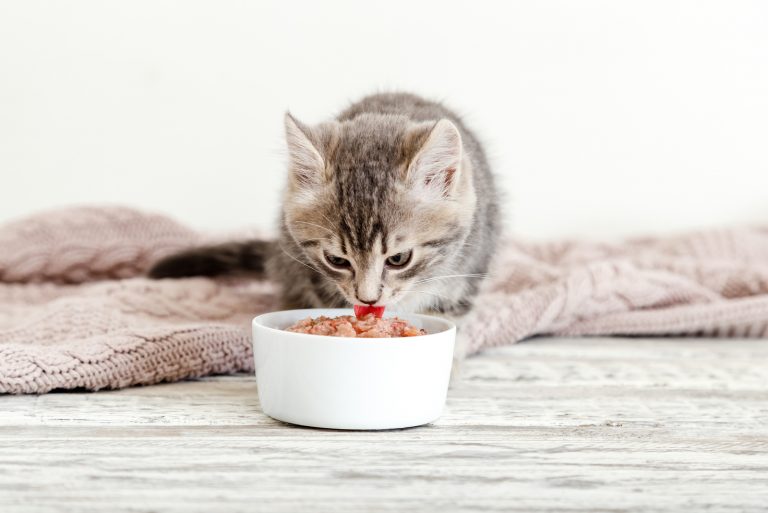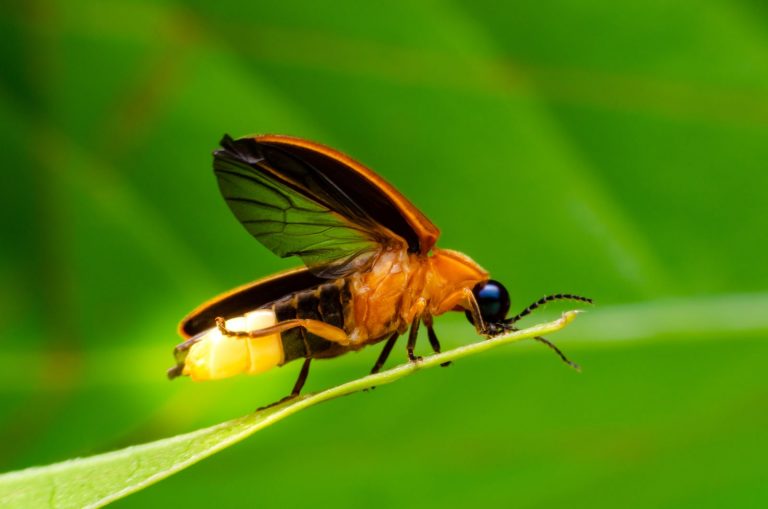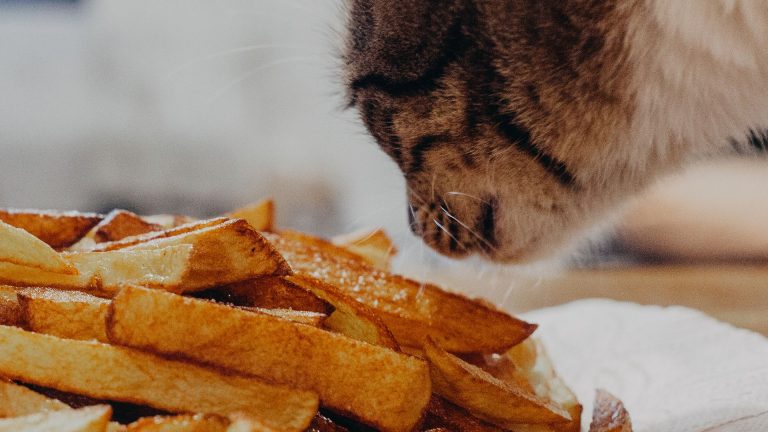Can Cats Eat Honey? Health Benefits And Side-Effects
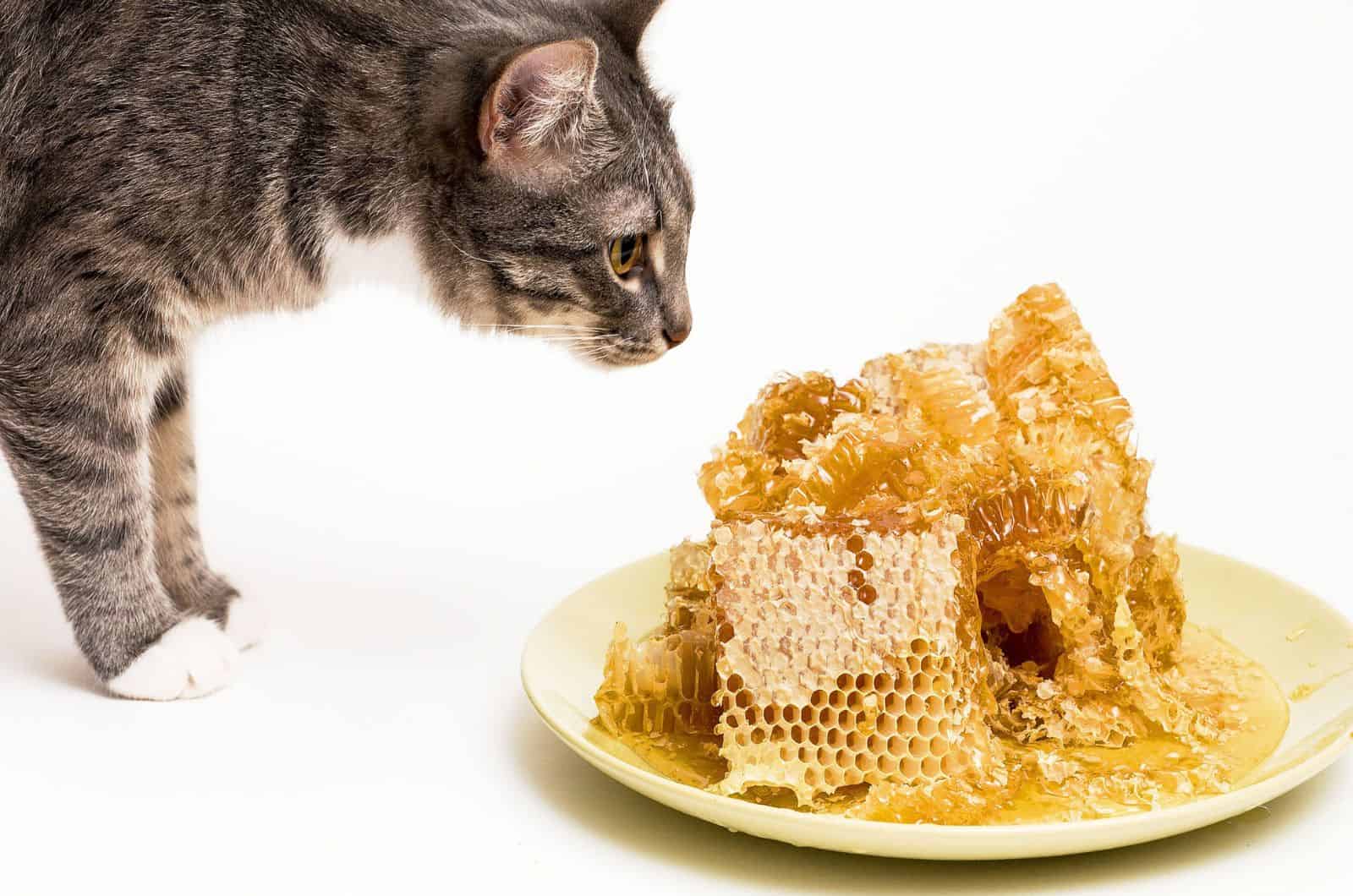
Honey is a sweet addition to our food and drinks. We can taste its sweetness and use it in many ways. Cats aren’t able to taste sweetness, at least not in the way people can.
This would be terrible for most humans – but not for cats because they have no idea how sugar tastes; the tongue of a cat lacks the necessary sweet receptors to sense the taste of honey or sugar, or any sweet taste. In fact, cats can’t distinguish sweetness from other tastes.
Can cats eat honey? They can, but it is not advisable.
Cats don’t have the necessary enzymes to dissolve the ingested honey and sugars. A cat’s liver cannot control the carbohydrate intake, and therefore it has a huge effect on the cat’s insulin levels.
There are a few health benefits associated with honey, but there are also some health risks that may come along with cats ingesting honey.
Read on to find out all you need to know about cats and honey!
Can Cats Eat Honey?
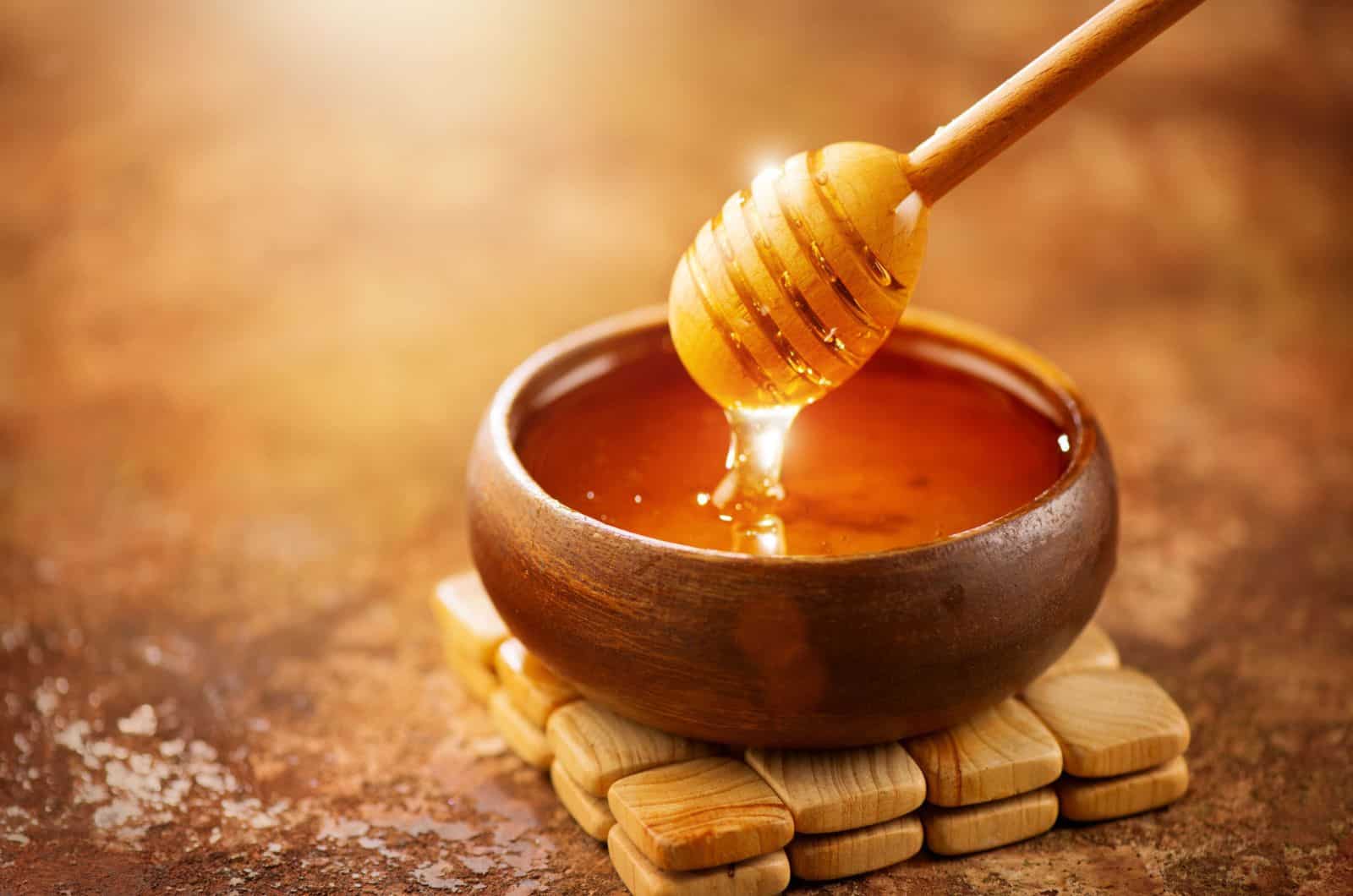
Have you ever wondered about cats and honey; can cats digest honey?
A cat’s body isn’t able to process honey (or any other sugar) as easily as a human’s body can. The cat’s digestive system cannot quite digest honey since cats don’t have the necessary liver enzymes to dissolve it and process it.
Honey contains high levels of sugars, i.e. glucose and fructose, and therefore it isn’t recommended for cats.
Is honey good for cats in any way? There are some health benefits associated with cats eating honey. However, these benefits can easily be acquired from less risky foods than honey.
When Is Honey Good For Cats?
While honey is not recommended for cats, there are several situations in which honey can be beneficial for your cat, but always remember to consult your vet about any significant change in your cat’s behavior and any change to their diet that you plan to make.
1. If Your Cat Has Allergies
Honey has been proven to be beneficial for humans when they have an allergic reaction. For cats, it is quite similar. If your cat suffers from an allergic reaction, for example a seasonal allergy or a reaction to a temporary allergen exposure, you can give a small amount of honey to your cat.
In fact, honey is one of the best natural antibiotics for cats!
Honey is thought to have a positive impact on the cat’s immune system. Always look for raw honey because processed honey loses much of the good nutritional values. Remember, before you do anything or try to treat your cat, always consult your vet for diagnosis, advice, and instructions.
2. Honey Encourages Weight Gain
If perhaps your cat has lost its appetite, or your cat is generally underweight, you can feed it some honey.
You may add a small amount of honey to the cat’s food, or give it a drop directly. Honey is good for treating a loss of appetite and soothing stomach aches. Remember that one tablespoon of honey has more than 60 calories, so less than half of this would be enough to stimulate your cat’s hunger so it will start eating again.
However, honey is never recommended for cats that are overweight, or that are already eating normally.
Related: Top 5 Choices Of Homemade Cat Food To Gain Weight
3. Helps Treat A Cat’s Sore Throat
Just like for people, honey helps with a cat’s sore throat as well. Honey has antibacterial properties, and a sore throat usually occurs due to a bacterial or viral infection, such as cat flu. If your cat happens to have a sore throat, consider giving it a tiny bit of honey, only a drop or two.
4. Treating A Cat’s Wounds
Many people use honey topically to treat pet wounds as honey has antibacterial and anti-inflammatory properties and is, therefore, good for helping to heal minor wounds.
Note: never give more than half a teaspoon of honey to your cat, no matter the medicinal purposes.
When Is Honey Bad For Cats?
As well as some of the good things that honey can do for your cat, feeding it to your cat is not recommended. Here are a few of the disadvantages of feeding honey to your cat.
1. Can Cause Botulism
Botulism is an uncommon illness that can cause cat paralysis. Ingestion of Botulinum toxin, a chemical generated by the bacterium Clostridium Botulinum, causes botulism. The majority of botulism infections in cats are caused by ingesting infected meat or dead prey.
2. Can Be Fatal For Diabetic Cats
Diabetes mellitus, or the inability to generate enough insulin to control blood sugar levels, affects an increasing number of cats in the modern world. If left untreated, this can cause vomiting, weight loss, lack of appetite, dehydration, depression, motor function issues, and it can even be fatal.
The most common diabetes symptoms include weight loss, increased thirst, and frequent urination.
Consuming honey may cause blood sugar levels to skyrocket in cats who already have diabetes, which can be dangerous if not addressed promptly.
3. Causes Or Worsens Diarrhea
Diarrhea is defined as a frequent, unformed, loose bowel movement. If cats eat more honey than is advised, it can cause diarrhea.
Diarrhea is not a disease but rather a symptom of various disorders. In any case, it can be very harmful to a cat’s health. Diarrhea that goes untreated for an extended period of time can cause dehydration and other, more serious, health issues.
Honey should not be given to treat diarrhea. Cats can be given lettuce to boost their hydration levels and to relieve constipation or other digestive disorders.
Health Benefits Of Honey
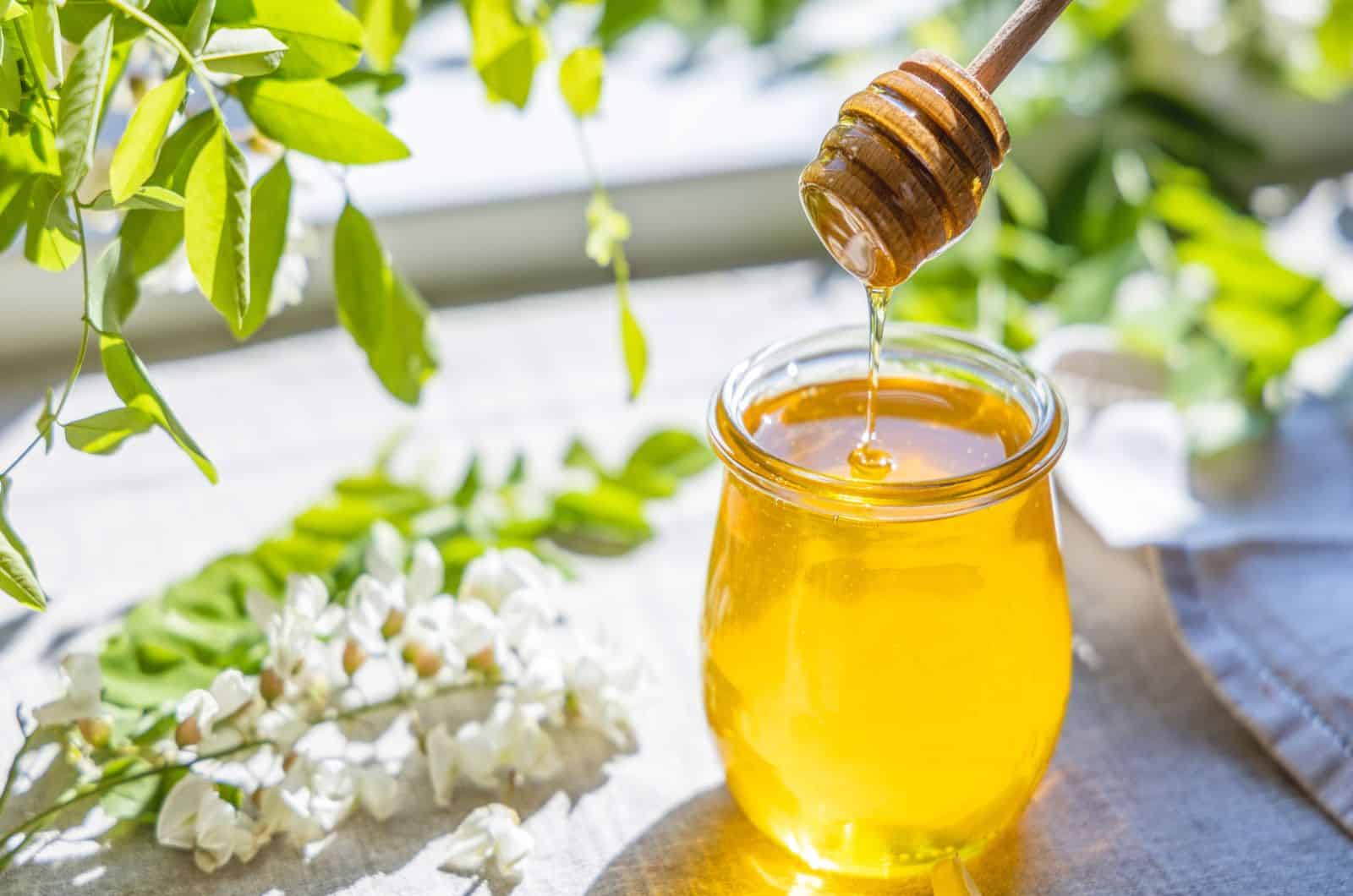
If you ever do decide to give a small amount of honey to your cat, don’t use any other type but raw Manuka honey. This is an all-natural honey that might have some health benefits, if not given in large amounts.
Honey has some antibacterial properties, it helps with allergies as we have seen, and it contains a lot of antioxidants.
However, always keep in mind that cats are obligate carnivores, so they require most of their diet to consist of protein from meat sources. Therefore, if you do decide you want to feed honey to your cat for any reason, first talk to your vet!
Honey contains a lot of minerals and vitamins which are good for cats, but it isn’t necessary to give your cat honey in order to satisfy your kitty’s daily need for vitamins and minerals.
Cats gain all their necessary vitamins, minerals, antioxidants, etc., from their regular diet of cat foods. If you really want to add something to your cat’s diet, or bring some innovation into their daily meals, consider bringing in an alternative to honey.
Read on for some advice on tasty cat treats that can be good for your cat! What do you think – are marshmallows a good cat-treat option? What about whipped cream – can whipped cream be an occasional treat as well?
Possible Side-Effects When Cats Eat Honey
Even though there are some health benefits of honey, there is a higher health risk involved.
Honey is full of sugars, and cats have a hard time digesting it, so an upset stomach, stomach aches, diarrhea, vomiting, tooth decay, obesity, and other digestive issues are all possible for your feline friend.
If your cat has accidentally consumed a tiny amount of honey, just keep a close eye on it. If you see any signs of illness, contact your veterinarian. If your cat has an undiscovered health problem, the honey it consumes might worsen its condition. If your pet is otherwise healthy, a small amount of honey will most likely produce digestive issues for a few hours.
I wouldn’t attempt giving honey to cats, despite its purported health advantages. Pumpkin, lettuce, blueberries, and broccoli are significantly more nutritious and high in antioxidants. These are both safe for cats and are also chosen by many cat food producers to add nutrition to their foods.
Instead of honey, choose such delectable snacks, treats designed for cats, and vet-approved vitamins.
You might also find this article interesting: Can Cats Eat Pancakes? This Is What You Need To Know
Honey Alternatives – Cat Treats

Honey hasn’t been declared as toxic to cats, but feeding your cat with it is not advised! There are various honey alternatives you can add to your cat’s diet as well as sweet treats like other human foods i.e. fruits and vegetables you can safely feed your cat.
• Yogurt With Honey – if your cat craves something different and craves the forbidden lactose and honey, you can feed it a very small amount of yogurt with honey. However, always use plain yogurt and always check the full list of ingredients. However, for our obligate carnivore pets, this is truly unnecessary. Here are some honey treat alternatives for your cat:
• Honey Ham – Ham will not damage your cat if eaten carefully in small amounts. However, if the ham contains honey and/or other artificial additives, you may want to rethink this decision. Keep in mind what these sugary supplements might do to your pet’s digestive system.
• Blueberries – more than half a teaspoon of honey isn’t allowed, the best option is no honey at all. This is why there are alternative treats to feed your cat. Blueberries are one of them, they are far more nutritious and full of antioxidants.
• Lettuce – lettuce is full of vitamins and dietary fibers as well as being low in calories. It is great for the cat’s immune system and for keeping your cat hydrated.
FAQ
Is honey harmful to cats?
Not when only given occasionally in a very limited amount, which is less than half a teaspoon of honey. If given in larger amounts, honey can be harmful to cats. Possible health risks include diarrhea, vomiting, upset stomach, lethargy, stomach ache, obesity, and other digestive problems.
Does honey contain sugar?
Yes. Honey not only contains sugar, it is actually very high in sugar and has a high calorie content. A tablespoon, i.e. about 20 g of honey contains more than 60 calories. This doesn’t seem a lot, and for humans it isn’t, but for cats, it can be extremely harmful.
Can cats and dogs eat honey?
Yes, but it is not recommended. Honey, when given in small, appropriate amounts isn’t harmful to cats or dogs. However, larger amounts of honey can be quite harmful for our beloved pets, and it is therefore better kept for humans while pets are given pet-safe treats.
What is the difference between honey and sugar?

Sugar has a greater glycemic index, which means it boosts blood sugar levels faster than honey does. This is because it contains more fructose and lacks trace elements. However, honey has more calories and it is also sweeter than sugar.
What is the best way to feed a cat honey?
If you do decide to include honey to your cat’s diet, for any reason or medicinal purpose, make sure to choose raw, untreated, preferably locally produced honey and limit it to less than half a teaspoon per day. You can give your cat a drop of honey directly into the mouth, or add it to the cat’s food or water.
As always, before changing your cat’s diet, or adding any new meals into its diet plan, consult with your vet.
How much honey can a cat eat?
Cats can consume honey, but only in small amounts. The maximum dose of honey for cats is less than half a teaspoon, this is safe for adult cats, but for kittens, it is best to completely avoid giving them any honey because it might create more severe health problems.
Final Words
Many cat owners wonder about cats eating human foods, in this case, honey. Can cats eat honey? Honey isn’t toxic for cats, so they are allowed up to half a teaspoon of honey, but it is really not advised. Kittens shouldn’t ingest a single drop of honey since their immune systems aren’t fully developed and they cannot process it at all. Adult cats are somewhat more hardy and can digest and survive a spoonful of honey without the worst consequences.
All in all, honey isn’t toxic, and it may even have a few health benefits for cats, but despite this, it isn’t advisable to give it to your feline friend. Honey isn’t necessary for your cat’s development or continued health and wellbeing. Your cat gains all the necessary nutrition that it needs from its meat-based diet. Cat foods and the occasional treat, preferably in the form of some safe vegetable or fruit, or a cat treat, will suffice.
If you want to reward your cat with something out of the ordinary, try some other alternative, like blueberries, lettuce, or carrots.

